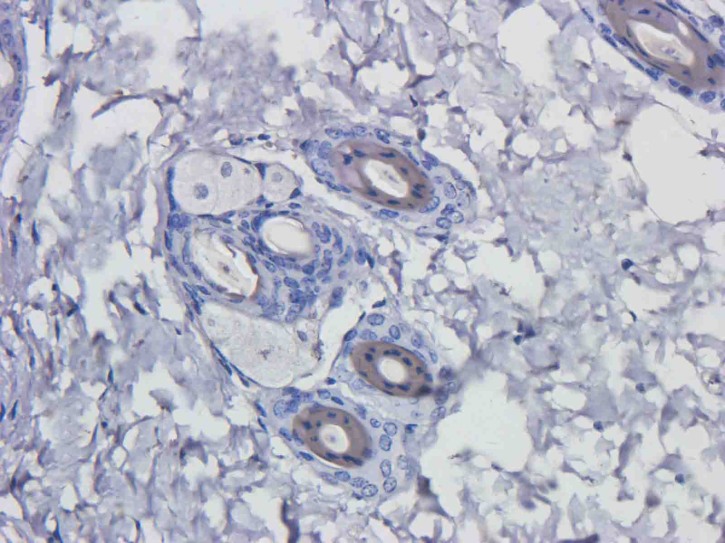EGFR Human Monoclonal Antibody [Clone ID: Matuzumab]
Other products for "EGFR"
Specifications
| Product Data | |
| Clone Name | Matuzumab |
| Applications | ELISA, FC, IF, WB |
| Reactivities | Human |
| Host | Human |
| Isotype | IgG1, kappa |
| Clonality | Monoclonal |
| Immunogen | The parental mouse antibody was generated by immunizing BALB/c mice intraperitoneally with A431 cells in phosphate buffered saline (PBS). Later on the humanzied version of the antibody was created by grafting CDRs of the murine antibody onto human constant regions. |
| Specificity | This antibody binds the extracellular domain III of the human EGFR and does not cross react with murine EGFR. It was also reported that residues S460/G461 in EGFR domain III are essential components of the epitope. This antibody binds at a site distinct from the EGF binding site, preventing conformational re-arrangement required for dimerization, a process essential for high-affinitiy ligand binding (Schmiedel, 2008). This antibody can only recognize the active form of EGFR. The antibody binds to both glyco- and aglyco receptor forms. EGFR is a transmembrane mitogenic glycoprotein with a cytoplasmically facing tyrosine kinase site which is activated by binding of the epidermal growth factor in the external domain. It also binds transforming growth factor alpha (TGFa). EGFR a member of the epidermal growth factor family and is closely related to receptor tyrosine kinases. This receptor tyrosine kinase binds ligands of the EGF family and activates signallying cascades to convert extracellular cues into appropriate cellular responses. Mutations that lead to EGFR overexpression (known as upregulation) or overactivity have been associated with a number of cancers, including lung cancer, anal cancers and glioblastoma multiforme as well as inflammatory diseases. This antibody is derived from a mouse parental clone mAb 425 which has demonstrated anti-tumor activity against solid tumors in phase I clinical trials. The binding characterization of this antibody to human EGFR was done using ELISA. This antibody was also found to bind human EGFR with a similar avidity as the parental mouse antibody 425 (PMID: 1798701). The parental mouse antibody 425 in combination with C225 (Cetuximab) reduced growth and survival of EGFR overexpressing MDA-MB-468 breast cancer cells more effectively than either antibody alone. The combination was also reported to effectively inhibited AKT and MAPK phosphorylation in MDA-MB-468 cell (PMID: 18424917). This antibody was used in a phase 1 study to investigate the safety and tolerability and to explore the pharmacokinetic and pharmacodynamic profile in patients with solid tumors that express EGFR (PMID: 14701780). This antibody has been used in various phase I studies alone or in combination with other therapeutic agents to treat patients with various type of cancers (PMID: 16533873; 16622465; 19238629). A study reported that the antitumor effects of matuzumab and cetuximab depend on inhibition of EGFR downstream signaling mediated by Akt or Erk rather than on inhibition of EGFR itself (PMID: 18033688). |
| Formulation | PBS with 0.02% Proclin 300. |
| Concentration | lot specific |
| Conjugation | Unconjugated |
| Storage | Please store at 4°C for up to 3 months. For longer storage, aliquot and store at -20°C. Avoid freeze and thaw cycles. |
| Stability | 3 years from dispatch. |
| Gene Name | epidermal growth factor receptor |
| Database Link | |
| Synonyms | ERBB; ERBB1; HER1; mENA; PIG61 |
| Reference Data | |
Documents
| Product Manuals |
| FAQs |
| SDS |
{0} Product Review(s)
0 Product Review(s)
Submit review
Be the first one to submit a review
Product Citations
*Delivery time may vary from web posted schedule. Occasional delays may occur due to unforeseen
complexities in the preparation of your product. International customers may expect an additional 1-2 weeks
in shipping.






























































































































































































































































 Germany
Germany
 Japan
Japan
 United Kingdom
United Kingdom
 China
China




